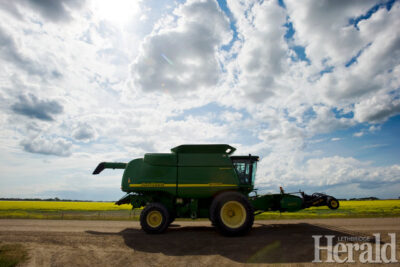Alberta farmers on the fence about carbon credits
By Alejandra Pulido-Guzman - Lethbridge Herald on April 23, 2022.
 Herald file photo
A combine travels along a gravel road among the fields east of Lethbridge during a past growing season in southern Alberta. A new report sheds light on why Alberta farmers are reluctant to use carbon credits that can potentially help lower emissions.
Herald file photo
A combine travels along a gravel road among the fields east of Lethbridge during a past growing season in southern Alberta. A new report sheds light on why Alberta farmers are reluctant to use carbon credits that can potentially help lower emissions.LETHBRIDGE HERALDapulido@lethbridgeherald.com
The School of Public Policy of the University of Calgary has released a report on why Alberta farmers are reluctant to use carbon credits that can potentially help lower emissions.
Report authors Nimanthika Lokuge and Sven Anders provide a comprehensive review highlighting the gaps in existing knowledge related to agricultural carbon credits and offsets with particular interest in Alberta.
According to the authors, “Participating in a carbon-credit system allows farmers to generate credits for reducing emissions; they can then sell those credits for cash on a credit market to emitters who need to purchase carbon-offset allowances for exceeding their mandated emission limits.”
There has been little exploration to date of the effectiveness of using carbon credits to encourage Alberta farmers to practice farming techniques that lower emissions, while earning extra revenue without jeopardizing their agricultural output.  Â
The authors state in the report that despite there being an active carbon-offset market in Alberta, however, farmers in the province hardly participate. This appears to be partly due to a history of regulatory risk: the agriculture sector has seen the revocation of carbon-credit eligibility for certain practices, and invalidated credits can lead to significant financial losses for farmers.
They add that farmers are also reluctant to participate due to the inadequacy of offset credit revenues in covering the foregone costs of implementing emission-reduction practices given current carbon-offset prices and the emissions level per farm.
As the province with the most beef cattle, the second-largest number of farms and farmed area in the country, and as one of Canada’s biggest producers of crops, Alberta is a huge part of the national agriculture sector. It has also been responsible for the highest level of agricultural greenhouse-gas emissions in the country. Â
According to the report, some lower-emission farming protocols have proved profitable for farmers by improving efficiency, even without carbon-offset incentives. While farmers may adopt these practices for their own reasons, they are reluctant to participate in Alberta’s carbon-offset market unless they are sufficiently rewarded.
The report also states that Alberta policymakers should emphasize the intrinsic efficiency benefits to farmers of implementing these protocols for their own sake. Convincing farmers in the province to invest in emission-reducing technologies for the purpose of making money in the current Alberta carbon market will, for the time being, remain a difficult sell.
It adds the fact that market conditions thus far have not encouraged them to do so. Alberta farmers may continue to largely sit out the carbon-credit market until returns for earning credits become more stable and more rewarding.
The report can be found online at www.policyschool.ca/publications/ Â
Follow @APulidoHerald on Twitter
4-3




